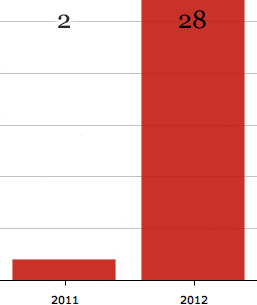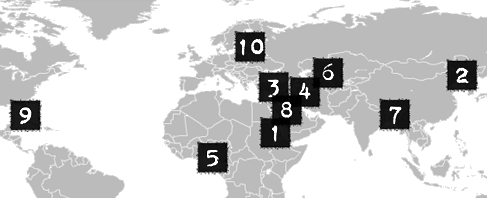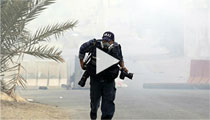Conditions for the press deteriorated severely since Syria’s uprising began in 2011. The Syrian government continued its media blackout by barring entry to most international journalists and controlling local news coverage. Foreign journalists resorted to smuggling themselves into the country, most across the borders with Turkey and Lebanon, to report on the conflict. Citizen journalists took extreme risks to videotape and document the unrest. Dozens of journalists were imprisoned over the course of the year and some were reportedly tortured in government custody. Local and international journalists were abducted by the government, the rebels, and non-Syrian Islamic extremist groups. Some remained missing in late year. With 28 journalists murdered, targeted by sniper fire, or killed in crossfire, CPJ ranked Syria as the most dangerous country in the world for the press in 2012. Although many of the fatalities were at the hands of government forces, numerous attacks against journalists or news outlets seen as pro-government were attributed to rebel forces, including two explosions at a TV station.
Syria
» Syria ranks as the most dangerous country in the world for journalists.
» Journalists are targeted, kidnapped, and killed by all sides in the conflict.
Conditions for the press deteriorated severely since Syria’s uprising began in 2011. The Syrian government continued its media blackout by barring entry to most international journalists and controlling local news coverage. Foreign journalists resorted to smuggling themselves into the country, most across the borders with Turkey and Lebanon, to report on the conflict. Citizen journalists took extreme risks to videotape and document the unrest. Dozens of journalists were imprisoned over the course of the year and some were reportedly tortured in government custody. Local and international journalists were abducted by the government, the rebels, and non-Syrian Islamic extremist groups. Some remained missing in late year. With 28 journalists murdered, targeted by sniper fire, or killed in crossfire, CPJ ranked Syria as the most dangerous country in the world for the press in 2012. Although many of the fatalities were at the hands of government forces, numerous attacks against journalists or news outlets seen as pro-government were attributed to rebel forces, including two explosions at a TV station.
CPJ documented a sharp increase in fatalities from 2011, when the uprising began. Fatalities dropped in the rest of the region in 2012.
Bahrain |  |
Egypt |  |
Iran |  |
Iraq |  |
Israel and the Occupied Palestinian Territory |  |
Libya |  |
Syria |  |
Tunisia |  |
Yemen |  |
CPJ's worldwide census, conducted on December 1, also documented a steep increase in detentions in Syria. Many, including one international reporter, had been held without charge for several months.
At least 21 local and international journalists were abducted in 2012 by various sides of the conflict, including government or pro-government militias; rebel or rebel-affiliated groups; and non-Syrian Islamic extremist groups, according to CPJ research. Of the 21, at least 13 had been released by year's end.
CPJ ranked Syria among the 10 Most Censored Countries in the world. Since demonstrators began calling for Bashar al-Assad's ouster in March 2011, the government imposed a blackout on independent news coverage, barring international reporters from entering and reporting freely and detaining and attacking local journalists covering anything inconsistent with the government line.

| 1. Eritrea 2. North Korea 3. Syria | 4. Iran 5. Equatorial Guinea 6. Uzbekistan | 7. Burma 8. Saudi Arabia 9. Cuba | 10. Belarus |

